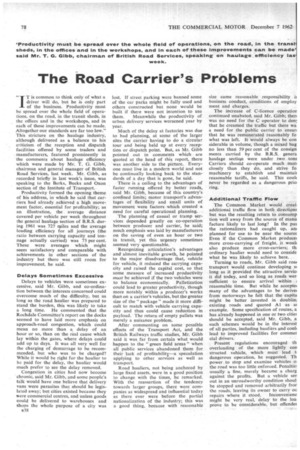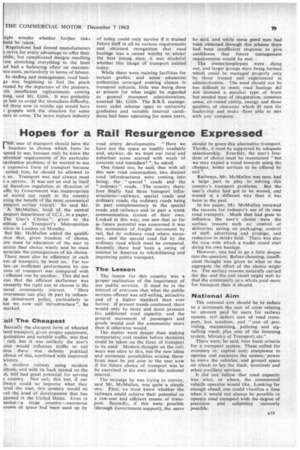The Road Carrier's Problems
Page 80

Page 81

If you've noticed an error in this article please click here to report it so we can fix it.
1
" T is common to think only of what a
driver will do, but he is only part of the business. Productivity must be spread over the whole field of operations, on the road, in the transit sheds, in the offices and in the workshops,. and in each of these improvements can be made. Altogether our standards are far too low." This stricture on the haulage industry, although delivered as a balance to his criticism of the reception and dispatch facilities offered by some traders and . manufacturers, featured prominently in • the comments about haulage efficiency which were made by Mr. T. G. Gibb, chairman and general manager of British Road Services, last week. Mr. Gibb, as recorded briefly in last week's issue, was speaking to the Berks, Bucks and Oxon section of the Institute of Transport Productivity formed the opening theme of his address, in which he said that carriers had already .achieved a high movement factor, essential for profitability; as an illustration, the average distance covered per vehicle per week throughout the general haulage section of B.R.S. during 1961 was 727 riles and the average loading efficiency for all journeys (the ratio between carrying capacity and tonnage actually carried) was 73 per cent. These were averages which might seem satisfactory and comparable with achievements in other sections of the industry but there was still room for improvement, he said.
Delays Sometimes Excessive
Delays to vehicles were sometimes excessive, said Mr. Gibb, and co-ordination between the interests concerned could overcome much of the difficulty, but as long as the road haulier was prepared to stand the burden, this was likely to take a long time. He commented that the Rochdale Committee's report on the docks seemed to have laid more emphasis on approach-road congestion, which could mean no more than a delay of an hour or so, than on the real cause which lay within the gates, where delays could add up to days, It was all very well for the charging of demurrage to be recommended, but who was to be charged? While it would be right for the haulier to be paid for the delay, the haulier would much prefer to see the delay removed.
Congestion in cities had now become chronic, said Mr. Gibb, and some people's talk would have one believe that delivery vans were parasites that should be legislated away; but cities existed because they were commercial centres, and unless goods could be delivered to warehouses and shops the whole purpose of a city was
B38
lost, If street parking were banned some of the car parks might be fully used and others constructed but none would be built if there were not intention to use
them. Meanwhile the productivity of urban delivery services worsened year by year.
Much of the delay at factories was due to bad planning, at some of the larger sites the carrier having to do a circular tour and being held up at every reception or dispatch point. But, as Mr. Gibb pointed out in comments which are quoted at the head of this report, there was another side to the picture. Everyone must live in a modern world and not be continually looking back to the standards of a day that is gone, he said.
There is a ceiling to the advantages of faster running offered by better roads, said Mr. Gibb, because of this country's confined limits; motor transport's advantages of flexibility and small units of movement were factors which created a need for careful operational planning. .
The planning of casual or tramp services depended greatly on co-operation between producer and carrier, he said; much emphasis was laid by manufacturers on the saving of even an hour or two in transit, yet this urgency sometimes seemed very questionable.
Recognizing articulation's advantages and almost inevitable growth, he pointed to the major disadvantage that, vehicle for vehicle, it reduced the carrying capacity and raised the capital cost, so that some measure of increased productivity must be achieved if the two vehicles were to balance economically. Palletization could lead to greater productivity, though more notably within a producer's works than on a carrier's vehicles, but the greater size of the " package" made it more difficult to match with vehicle carrying capacity and thus could cause reduction in payload. The return of empty pallets was merely a nuisance problem.
After commenting on some possible effects of the Transport Act, and the British Railways traffic studies, Mr. Gibb said it was far from certain what would happen to the "green field areas" when all public services abandoned them for their lack of profitability—a speculation applying to other services as well as transport.
Road hauliers, not being anchored by large fixed assets, were in a good position to change with the times, he remarked. With the reassertion of the tendency towards larger groups, there were companies as widespread and influential today as there ever were before the partial nationalization of the industry; this was a good thing, because with reasonable size came reasonable responsibility it business conduct, conditions of employ ment and charges.
The increase of C-licence operation continued unabated, said Mr. Gibb; then was no need for the C operator to den] that he creamed the traffic but there wa: a need for the public carrier to ensun that he was remunerated reasonably fo what was left. It Would always be con siderable in volume, though a mixed bag no less than 59 per cent of the consign ments carried by the B.R.S. genera haulage section were under two tons Carriers .should co-operate much mord closely than they do, and strive fo machinery to establish and maintaii reasonable tariffs, he said. This could never be regarded as a dangerous prici ring.
Additional Traffic Flow
The Common Market would creat, additional traffic flow in both directions but was the resulting return to consump tion well away from the source of manu facture likely to last long? In the pas the rationalizers had caught up, am planned for use to be near the source Even if the Common Market produced more cross-carrying of freight, it would also produce more cross-carriers; th ordinary haulier would need to conside what he was likely to achieve here.
Turning to roads, Mr. Gibb said road transport would continue developing SI long as it provided the attractive servic it did today, and so long as roads wen sufficient to ensure arrival within reasonable time. But while he accepted many of the advantages to he derived from motorways he felt that the capita might be better invested in doublin; existing roads and quoted Al as ai example. Some specification of routes, a has already happened in one or two cities should be accepted, said Mr. Gibb, a such schemes would be in the interest of all parties, including hauliars and could lead to improved facilities for comrner cial drivers.
Present regulations encouraged th overloading of the more lightly con structed vehicle, which must lead t, dangerous operation, he suggested. Th power , to stop and examine vehicles oi the road was too little enforced. Penaltie usually a fine, merely became a charg against the profits. But a vehicle seri out in an unroadworthy condition shoul. be stopped and "removed arbitrarily fror the roads, leaving its owner to carry ou repairs where it stood. Inconvenienc might be very real, delay to the loa, prove to be considerable, but offender
ight wonder whether furt,her risks • uld be taken.
Regulations had forced manufacturers strive for every advantage to offer their blic, but complicated designs resulting om stretching everything to the limit ad had a balancing effect on maintennee costs, particularly in terms of labour. In staffing and management, road haulge was beginning to feel the pinch reated by the departure of the pioneers, ith insufficient replacements coming long, said Mr. Gibb. It was probably )c) late to avoid the immediate difficulty, lid those now in middle age would have ) grapple with the situation for some ears to come. The more mature industry
of today could only survive if it trained future staff in all its various requirements and obtained recognition that road haulage was a ,career worthy to attract the best young men; it was doubtful whether this image of transport existed today.
While there were training facilities for certain grades, and some education authorities arranged evening classes in transport subjects, little was being done at present for what might be regarded as general transport administration, asserted Mr. Gibb. The B.R.S. management cadet scheme open to university graduates and suitable internal candidates had been operating for some years,
he said, and while some good men had been obtained through this scheme there had been insufficient response to give confidence that future management requirements would be met.
The owner/employers were dying out, and larger groups were being formed which could be managed properly only by those trained and experienced in administration. The need should not be too difficult to meet; road haulage did not demand a peculiar type of brain but needed men of imagination, common sense, all-round ability, energy and those qualities of character which fit men for leadership and make them able to mix with any company.




























































































































